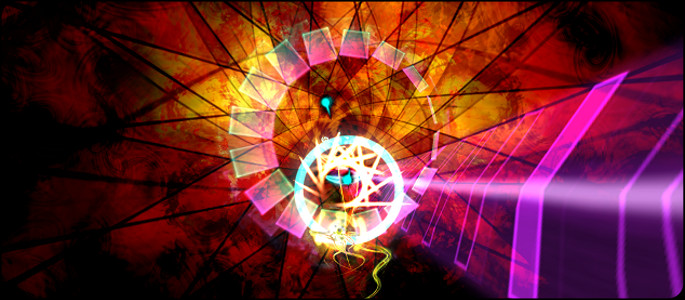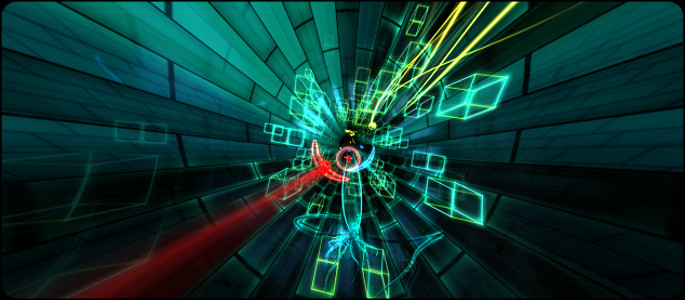With the recent success of games like Journey and Limbo, the world has finally started to notice just how big of a threat some of the smaller development teams are starting to be for AAA titles. The next game that should not be underestimated comes from one of the smallest development teams imaginable. With a team formed primarily of one man, and just a few team members for key aspects, Dyad is set to hit the PSN store on July 17th. Dyad is a tunnel racer that takes common perceptions, and forces you to think beyond your means in both reaction time and perception.
At first you may wonder why Dyad is considered a racer on any level. Well the reason is simple, to be a racer, all you need to do is be able to do is push yourself to your limits – and Dyad sets to challenge even the most seasoned competitor. Using your primary method of acceleration, a grapple ability that causes you to vault toward your opponent, you are able to throttle just how fast you want to travel through each level. A simple, but unique method to induce a similar effect that a gas pedal in a car would. Yet, Dyad does not limit its options to just the ability to grapple. Advanced techniques are trickled into each level, giving you the options to create speed bridges, and utilize dangerous maneuvers to build momentum. Leaving the user with enough options to eventually string together enough momentum to travel at incomprehensible speed, which really must be experienced.

While most of its concepts are simple in nature, Dyad brings in a mental conflict, or duality that becomes an internal struggle the whole time you play it. From the beginning you are ingrained with a simple concept that has carried over from generations of gaming, do not run into your opponent, and completely flips the idea on its head. As you are inevitably introduced to the Lancer ability, an ability that increases momentum by plowing through opponents for a limited time. During the initial levels of Dyad this gives you a false sense of simplicity, and makes you wonder just how deep this interactive kaleidoscope really is. Well, to give you a good understanding just how far down the rabbit hole Dyad will take you – there is one very simple fact. Each of the 27 levels introduces a completely new concept, which will forever change the way you interact its world. This concept creates a difficulty curve that has peaks for you to overcome along the way, giving a relatively short game an extended life.
The complexity of Dyad can be both its strongest point as well as its weakest as, at some points, you seem to wonder how much you are in control, and how much you are just being lucky to get past some challenges. Early on, some players might eventually be met with a challenge that seems within reach, only to have it slip further and further away. This is exactly what makes Dyad one of the best racing concept games I have played in a while, as you eventually realize you are the reason for your own failure. Keeping calm, and understanding your lines while controlling your acceleration becomes mandatory to achieve the full experience. This in itself creates some of the best and most challenging racing game play, yet with only the inclusion of a online leader board, Dyad would have benefited with some visual competition like ghost opponents or simply live multiplayer.

As a retail release Dyad would not be able to compete, but luckily it is releasing on PSN for only $15, and for that price Dyad does contain enough product to give you hours of magnificent eye-candy and frustration; depending on how far you dive in. In the initial product, there are 27 levels which must be beaten in succession. Once beaten though, each level offers 2 distinct options: Trophy Mode – a set of specific rules, that if beaten reward the player with a trophy, and Remix Mode – a set of options that can turn an already chaotic level into a completely new experience. As modifiers range from adjusting the tempo of the music, to completely changing the color scheme of the level as a whole, the amount of replay value will solely fall on these options and the leaderboard once you complete each stage, so some players may find the game short, while others a deep engrossing experience.
Utilizing more colors than found on a tie-dye t-shirt, Dyad is a prime example of why games come with an epilepsy warning at the beginning. Starting out fairly simple in the initial levels and advancing to complete insanity to the later levels, the complexity of the backgrounds follow a similar tiered system of its gameplay. The first set of levels are incredibly simple in its color scheme, but the stark contrasts come across elegant and almost serene. Matching the tone of the gameplay, Dyad eventually becomes complete visual chaos. At the sacrifice of some of its elegance, the imagery becomes an amplification of the tension created by the speed needed to traverse the later levels. With all of that said, just look at some of the images of Dyad and you should have an idea of what you are getting into.

With the amount of attention given to the graphical fidelity of Dyad, it is a wonder just how much attention was left for other components. Musically, Dyad does some interesting things with its sound; instead of just having an overlaying track, the music is formed by a dynamic melody that is composed of your actions within the level. Incorporating a multitude of sound effects, there are times when a level will sound like an absolute mess, and other times it becomes quite rhythmic. All of this seems to be determined on your performance, and ability to discern lines, much like a race car driver would look for on a track. So it is difficult to say whether or not I would qualify the music as good or bad, just simply that it is an interactive techno-centric soundboard. This is not to say that it can escape judgment, it just varies from a befitting melodic trance, to a repetitive track filled with annoyances. In my experience of playing through Dyad, I found that I had found some levels that were good fits and did enhance my ability to get into the game, while others become agonizingly repetitive and took me out of the experience.
For its surprisingly low asking price, Dyad is a visual powerhouse that must be seen to fully comprehend. All in all, Dyad is a solid game for a good value, and I would recommend it to anyone who enjoys abstract games that are simple in nature, but complex in execution. Yet, for those of you who do not find competing over a leaderboard or replaying a modified level fun, you will only be left with trying to 3 star 27 levels; something that could be completed in a day or two.
-
Graphically interesting
-
Intense game play
-
Unless you're a trophy hunter, a short game.








